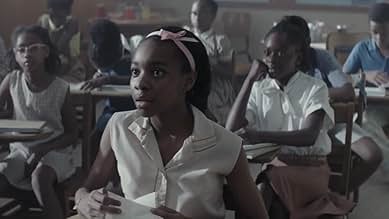NOTE IMDb
7,3/10
20 k
MA NOTE
En 1971 à Durham en Caroline du Nord, Ann Atwater est militante pour les droits civiques et affronte le C. P. Ellis du Ku Klux Klan sur la question de l'intégration scolaire.En 1971 à Durham en Caroline du Nord, Ann Atwater est militante pour les droits civiques et affronte le C. P. Ellis du Ku Klux Klan sur la question de l'intégration scolaire.En 1971 à Durham en Caroline du Nord, Ann Atwater est militante pour les droits civiques et affronte le C. P. Ellis du Ku Klux Klan sur la question de l'intégration scolaire.
- Récompenses
- 5 nominations au total
Histoire
Le saviez-vous
- AnecdotesThe restaurant scene was shot at Ross's Diner in Cartersville, Georgia.
- GaffesOn the plaque honoring Claiborne as Exalted Cyclops of the Year, misspellings include "Claibourne" and "exhalted".
- Citations
C.P. Ellis: She looked at me like I was some kind of monster.
Mary Ellis: What did you expect?
- Bandes originalesBlue Bayou
Written by Roy Orbison and Joe Melson
Performed by Roy Orbison
Courtesy of Legacy Recordings, a division of Sony Music Entertainment
By arrangement with Sony Music Entertainment
Commentaire à la une
Greetings again from the darkness. It's easy to complain (and many do) about how Hollywood usually explores racism. Sometimes the stories seem a bit over-simplistic, as with THE HELP, GREEN BOOK, and HIDDEN FIGURES; however, rather than criticize, perhaps we should be thankful for any effort to prod. Often getting the conversation started is the best first step. That's really the message from Robin Bissell's directorial debut of a script he adapted from Osha Gray Davidson's 1996 book "The Best of Enemies: Race and Redemption in the New South". Mr. Bissell has previously been Executive Producer on THE HUNGER GAMES and SEABISCUIT, and Mr. Davidson's book was previously adapted for a stage production.
Based on a true story that took place in 1971 Durham, North Carolina, the film portrays the remarkable events that led to the integration of public schools and a stranger-than-fiction friendship. Taraji P Henson stars as Ann Atwater, an African-American activist and community organizer, while Sam Rockwell co-stars as Claiborne "CP" Ellis, the Exalted Cyclops (basically the Chapter President) of the Ku Klux Klan. It seems the previous stranger-than-fiction description is aptly applied here when an aggressive black woman known as "Roughhouse Annie" can effectively sway the long ingrained beliefs of a KKK leader, and forge a friendship that would last 3 decades.
A school fire that partially gutted the elementary school attended by the black children in the community was the proverbial spark that kicked off the chain of events. When the white folks refused to share their school, the black children were forced to hold classes in the areas least affected by the fire ... while demolition and renovation was being carried out. This led to the NAACP getting involved, which resulted in a judge ordering a "Charrette" - a blend of a committee and a civic debate - to determine how the community would move forward. Bill Riddick (Babou Ceesay, FREE FIRE, 2016) was charged with organizing the Charrette, and he named Ms. Alexander and Mr. Ellis as co-chairs. Keep in mind this was 17 years after Brown vs. Board of Education ruled in favor of school desegregation, but many pockets of the south were slow to come around.
The story structure offers synchronicity between the lives of Alexander and Ellis, as they each struggle with poverty and family challenges. It's just one of the ways of trying to show they were more alike than different, and much more of the time is devoted to how the transition slowly occurs for Ellis. Of course, even though each side dislikes the other, it's Ellis whose eyes must be opened as he clings to the only way of life he's known. Because of this, Mr. Rockwell has the meatier role, but it's Ms. Henson (and her fat suit) who draws the most laughs and nods of approval from the audience.
As you would expect, it's a strutting Mr. Rockwell and boisterous Ms. Henson that dominate the film, however, some tremendous actors fill the supporting roles: Wes Bentley (as a Confederate soldier hat-wearing Klansman), Anne Heche (as Ellis' wife), Nick Searcy, Bruce McGill, John Gallagher Jr, and Caitlin Mehner.
The film is a most entertaining (though a bit lightweight) look at an historic chain of events, and it's right up there with a black cop infiltrating the Klan in Spike Lee's 2018 film BLACKkKlansman for believe-it-or-not points. In 1980, Studs Terkel conducted an interview with Mr. Ellis, and it's worth a read to gain a bit more insight into a man that truly changed his evil ways. The ending of this film leans heavily on the "feel-good" and "can't we all just get along" approach, and maybe that's not such a bad thing. The end credit sequence features some tremendous clips of the real Ms. Alexander (who died in 2016) and Mr. Ellis (who died in 2005), making it a bit easier to understand how the two opposites connected for the greater good.
Based on a true story that took place in 1971 Durham, North Carolina, the film portrays the remarkable events that led to the integration of public schools and a stranger-than-fiction friendship. Taraji P Henson stars as Ann Atwater, an African-American activist and community organizer, while Sam Rockwell co-stars as Claiborne "CP" Ellis, the Exalted Cyclops (basically the Chapter President) of the Ku Klux Klan. It seems the previous stranger-than-fiction description is aptly applied here when an aggressive black woman known as "Roughhouse Annie" can effectively sway the long ingrained beliefs of a KKK leader, and forge a friendship that would last 3 decades.
A school fire that partially gutted the elementary school attended by the black children in the community was the proverbial spark that kicked off the chain of events. When the white folks refused to share their school, the black children were forced to hold classes in the areas least affected by the fire ... while demolition and renovation was being carried out. This led to the NAACP getting involved, which resulted in a judge ordering a "Charrette" - a blend of a committee and a civic debate - to determine how the community would move forward. Bill Riddick (Babou Ceesay, FREE FIRE, 2016) was charged with organizing the Charrette, and he named Ms. Alexander and Mr. Ellis as co-chairs. Keep in mind this was 17 years after Brown vs. Board of Education ruled in favor of school desegregation, but many pockets of the south were slow to come around.
The story structure offers synchronicity between the lives of Alexander and Ellis, as they each struggle with poverty and family challenges. It's just one of the ways of trying to show they were more alike than different, and much more of the time is devoted to how the transition slowly occurs for Ellis. Of course, even though each side dislikes the other, it's Ellis whose eyes must be opened as he clings to the only way of life he's known. Because of this, Mr. Rockwell has the meatier role, but it's Ms. Henson (and her fat suit) who draws the most laughs and nods of approval from the audience.
As you would expect, it's a strutting Mr. Rockwell and boisterous Ms. Henson that dominate the film, however, some tremendous actors fill the supporting roles: Wes Bentley (as a Confederate soldier hat-wearing Klansman), Anne Heche (as Ellis' wife), Nick Searcy, Bruce McGill, John Gallagher Jr, and Caitlin Mehner.
The film is a most entertaining (though a bit lightweight) look at an historic chain of events, and it's right up there with a black cop infiltrating the Klan in Spike Lee's 2018 film BLACKkKlansman for believe-it-or-not points. In 1980, Studs Terkel conducted an interview with Mr. Ellis, and it's worth a read to gain a bit more insight into a man that truly changed his evil ways. The ending of this film leans heavily on the "feel-good" and "can't we all just get along" approach, and maybe that's not such a bad thing. The end credit sequence features some tremendous clips of the real Ms. Alexander (who died in 2016) and Mr. Ellis (who died in 2005), making it a bit easier to understand how the two opposites connected for the greater good.
- ferguson-6
- 4 avr. 2019
- Permalien
Meilleurs choix
Connectez-vous pour évaluer et suivre la liste de favoris afin de recevoir des recommandations personnalisées
- How long is The Best of Enemies?Alimenté par Alexa
Détails
- Date de sortie
- Pays d’origine
- Site officiel
- Langues
- Aussi connu sous le nom de
- Los mejores enemigos
- Lieux de tournage
- Bartow County Courthouse, Cartersville, Géorgie, États-Unis(Court house scene)
- Sociétés de production
- Voir plus de crédits d'entreprise sur IMDbPro
Box-office
- Budget
- 10 000 000 $US (estimé)
- Montant brut aux États-Unis et au Canada
- 10 205 616 $US
- Week-end de sortie aux États-Unis et au Canada
- 4 446 190 $US
- 7 avr. 2019
- Montant brut mondial
- 10 209 813 $US
- Durée2 heures 13 minutes
- Couleur
- Rapport de forme
- 2.35 : 1
Contribuer à cette page
Suggérer une modification ou ajouter du contenu manquant

Lacune principale
What was the official certification given to The Best of Enemies (2019) in France?
Répondre








































